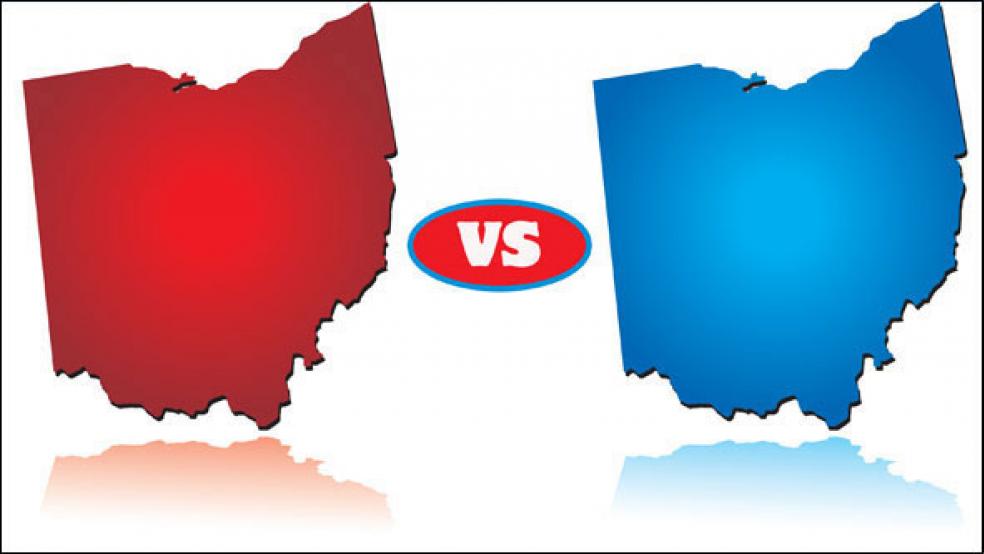MASON, Ohio – The second grade school teacher might have been describing one of her unruly charges. “He seems like a big goofball,” said Rebecca Holt, 54, who stopped long enough in the 100-degree heat outside a Wal-Mart here to describe former Massachusetts Gov. Mitt Romney .

A lifelong Republican who voted for John McCain in the last election, she still hasn’t warmed to the Republican Party’s presumptive nominee. “He flip-flops on some issues,” she said. “And from his history he doesn’t look out for the little guy – just the big guy.”
So will she be supporting President Barack Obama in the fall? “I don’t think he’s said what he’ll do (in a second term). Unemployment is still bad. He didn’t create all the jobs he said he would,” she said. But if she had to vote today, whom would she vote for? “I’d have to get in that booth and pray,” she said.
The suburban counties surrounding Cincinnati in Southwest Ohio represent the heart of this swing state’s Republican base. This past weekend, House Speaker John Boehner, who hails from the area, cut the ribbon on another local Romney headquarters. The state’s Republican leaders recognize Romney will have to rack up huge margins here to offset the big Democratic majorities in Cleveland and the Northeast if he is to have any hope of winning a state that is crucial to his presidential hopes.
While the latest polls show the president with a fairly sizable lead in Ohio, which has widened to nine points in recent weeks, it could melt as fast as ice cream in the past week’s oppressive heat if interviews with a range of voters here are any indication. They suggest Romney isn’t the only one battling an enthusiasm gap.
Obama appears to have less support from young voters and potential voters than he did four years ago. Tom Kondash, a 23-year-old college graduate who recently returned to the area after landing a good job with Morris Technologies, a local engineering firm, says he has no plans to vote this year – at least in the presidential race.
“I feel at some point when there’s someone who can make a difference in the White House, I’ll vote for him,” he said as his fiancé, also a recent grad, nodded in agreement. “I don’t think either of these guys can do that.”
Yet it’s not as if young voters like Kondash have become less liberal or less attuned to Obama’s core message. Pressed to mention what issues were important to him, the newly-minted mechanical engineer said “we’re not investing in the right things – like education. My mom’s a teacher and they’re cutting everything. That’s what counts for a society in the long run,” he said.
Obama won this state handily in 2008 largely because of a huge outpouring of young and minority voters. He won Hamilton County, which includes Cincinnati and its inner-ring suburbs, by 30,000 votes. Massachusetts Sen. John Kerry lost the traditionally Republican county by 23,000 votes in 2004.
But local Democratic officials admit they face a more treacherous electoral landscape this time around. “After more than three years in office, Obama has made decisions that have either pleased or displeased a lot of people,” said Caleb Faux, executive director of the Hamilton County Democratic Party. “Also, getting people enthused about throwing the Republican out of the White House isn’t a factor. That makes things much more difficult.”
Democrats are hoping that public employees and minorities will make up for some of the lost enthusiasm among the young. Last year, public employees, including police and firefighters who have tended to vote Republican in the past, mobilized to overturn Senate Bill 5, a law pushed by Republican Gov. John Kasich that had eliminated public employees’ right to collective bargaining.
RELATED: Right-to-Work Legislation Takes on Big Labor
Those groups are now turning their attention to the presidential race, Congress and state legislative races, according to Faux. The campaign has already opened three offices with a dozen paid staffers, which he expects will rise to 30 by November. Four years ago, the Obama campaign never had more than two dozen paid staffers in Hamilton County.
“S.B. 5 galvanized a lot of traditional Democratic groups who had become lazy over the years,” said Paul Leonard, a political science professor at Wright State University who previously served as the state’s lieutenant governor. “That coalition is carrying over into the presidential election and that should help Obama.”
But the Republican Party is fielding an energized grass roots operation of its own, fed in part by an outpouring of Tea Party activists who may not have backed Romney during primary season but are carrying a fiery “anybody but Obama” attitude into the general election. “We’re above four years ago in terms of enthusiasm,” said David Nichols, chief of the Republican Party in Warren County, one of three suburban counties ringing more urban Hamilton County.
“The Tea Party became very active here two years ago so we’ve reached out,” said the 50-year-old retired chief executive officer, whose company, Interlott, made instant lottery game machines before selling out to a conglomerate. “They feel there were other candidates they were much more enthusiastic about, but they realize Romney is so much better than Obama.”
Local volunteers have already begun knocking on doors, running phone banks and putting up yard signs – all the usual accoutrements of a grass roots ground campaign. But they are also benefitting from a massive air war launched by outside political action committees that are unconnected to the party. The so-called Super PACs have been blanketing Ohio with ads featuring Obama’s verbal slip that “private-sector jobs are doing just fine.”
It appears to be dampening enthusiasm among white blue-collar voters, who have always been a key part of the Democratic Party’s base here and for whom the economy remains the number one issue. “I was out of work for a while; it was real tough to get another job,” said 50-year-old Alex Young, who restocks retail outlets for Frito-Lay.
Tugging at his neatly-clipped goatee as he leaned against his van, Young said he is leaning toward voting for Obama, as he did four years ago, but he has seen lots of ads that make him nervous. “They (the ads) say the private sector is doing fine. Whoever is putting that on, it’s making him look bad,” he said.


